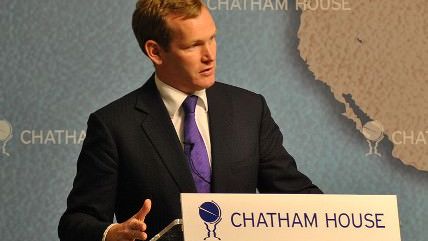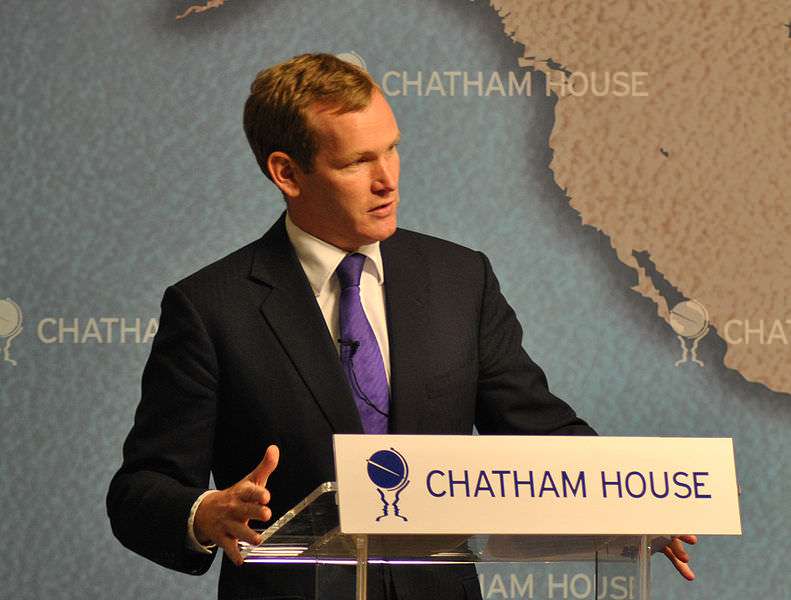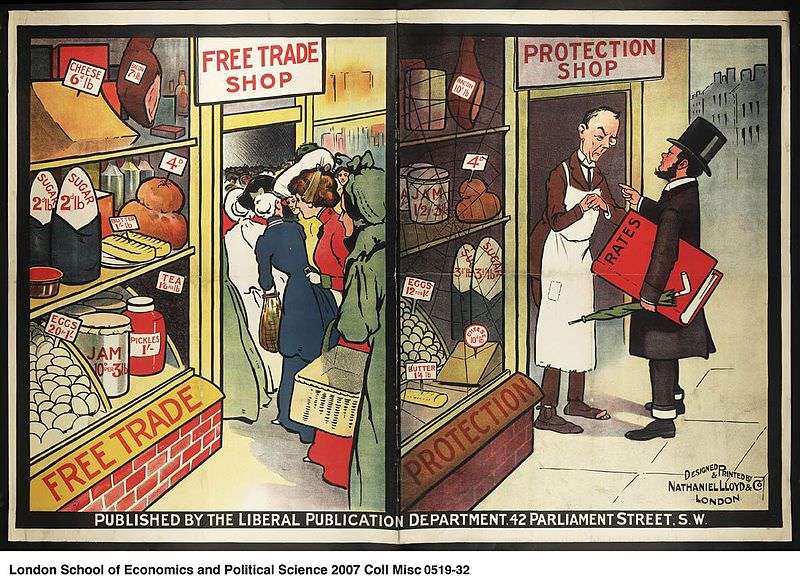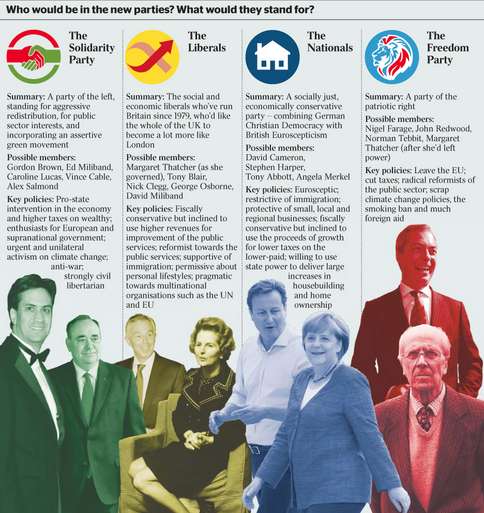The British Political Map Needs to Be Redrawn


Recent comments from a British legislator have highlighted an ideological conflict within the Liberal Democrats. Jeremy Browne, a member of parliament, has written a book called Race Plan, which outlines policies that he believes will prepare the U.K. for "the Asian Century."
In a review of the book for the Liberal Democrat Voice, Nick Thornsby outlines Browne's proposals, most of which sound sensible to me: cuts to government spending, a school voucher system that allows parents and teachers to make decisions, a reduction in the top tax rate. Browne reportedly wants the British state to be equivalent in size to between 35 and 38 percent of GDP—still too high for my liking, but a definite improvement on the current situation. Thornsby notes that on the day of Race Plans' publication (yesterday) he saw Browne described as a "Thatcherite" and "neoliberal," terms that are not meant as compliments by many Liberal Democrats.
According to Patrick Wintour, The Guardian's politics editor, Browne criticizes both Prime Minister David Cameron and the leader of his own party, Nick Clegg, for failing to defend markets in the face of criticism from Labour Party leader Ed Miliband:
He writes: "Both the governing parties have agonised over whether to ridicule or match Miliband's ideas, usually before trying to do both and while achieving neither. The result is a shortage of politicians who are prepared to bang the drum for free markets or to call the bluff of those that constantly wish to distort them."
It's great that Browne is calling out Clegg and Cameron for failing to stick up for markets when Miliband, who will prime minister if Labour wins the next general election, says that he would "bring back socialism" to the U.K. However, it is worth remembering that there are plenty of Liberal Democrats who are not fans of markets and may well vote for Labour in the next election, which is due to take place next year.
How can a pro-market, pro-tax-cuts liberal be in the same party as people such as Tim Farron, the president of the Liberal Democrats, who said Thatcher's government was "organized wickedness"?

The Liberal Democrats was founded in 1988, the result of a merger of the Liberal Party and the Social Democratic Party, which had been in alliance since 1981. The Liberal Party was "liberal" in the classical sense, backing limited government spending and free trade. The Social Democratic Party was founded by four former members of Labour cabinets dissatisfied with how left-wing the Labour Party had become. It formed the alliance with the Liberal Party shortly afterwards. These two camps are still on display today.
Browne's comments in Race Plan prompted David Priestland to write in The Guardian that the Liberal Democrats' dilemma shows why the U.K. needs four political parties:
In many countries, the forces of "liberalism"—meaning support for individual rights against authoritarian states and socially liberal causes (the environment, women's and gay rights)—have already split into two: one more economically liberal and suspicious of the state (like the German Free Democrats), and the other more sceptical of markets (such as the German Greens, or D66 in the Netherlands).
Britain, however, with its hopelessly antiquated electoral system, forces both types of liberal into three party blocs: free-market liberals are spread between the Tories and Lib Dems, while leftwing liberals are divided between Labour and the Lib Dems. Meanwhile, the Lib Dems themselves are condemned to continuous civil war between the two camps and, most seriously, the electorate is denied a clear choice.
Tim Montgomerie, who used to edit the blog Conservative Home and now writes for The Times, wrote last December about the theoretical political parties that reflect contemporary Britons' attitudes: The Solidarity Party, The Liberals, The Nationals, and The Freedom Party. Under Montogerie's proposal the different factions of the Liberal Democrats would be split:

It's unlikely that a party system like the one Montgomerie envisions is going to emerge anytime soon, but it would be nice for classical liberals in the U.K. to have a home again.
* Disclosure: I used to work at Liberal Democrats' headquarters.
Editor's Note: As of February 29, 2024, commenting privileges on reason.com posts are limited to Reason Plus subscribers. Past commenters are grandfathered in for a temporary period. Subscribe here to preserve your ability to comment. Your Reason Plus subscription also gives you an ad-free version of reason.com, along with full access to the digital edition and archives of Reason magazine. We request that comments be civil and on-topic. We do not moderate or assume any responsibility for comments, which are owned by the readers who post them. Comments do not represent the views of reason.com or Reason Foundation. We reserve the right to delete any comment and ban commenters for any reason at any time. Comments may only be edited within 5 minutes of posting. Report abuses.
Please to post comments


Sounds like The Liberals are still the best bet.
Were they to divorce themselves from the Social Democrats, maybe. In their current state, they are generally more statist than the Tories and less statist than Labour (though the Tories are giving them a run for their money).
Reads to me like a lot of squish, which always seems to resolve on the side of mo' bigga government.
Based on the chart, I'm liking the Freedom Party. They seem interested in ripping out big chunks of the Total State by the roots, rather than simply pruning them into more pleasing topiaries.
Sure, I see that. And they have a bitchin' name and logo.
I believe that was meant to be a poison pill. "They want to end climate change policies?!"
The Liberal Party was one of the few classical liberal parties in Europe with any life in it before its merger with the Social Democrats. Sadly, the LDP is one of the most execrable parties in British politics -- and Clegg a complete and utter piece of shit. Warts and all, to be honest I believe that UKIP is a more worthy successor of the old liberal tradition than the LDP or any of the other mainstream British parties.
This. Why the hell did the Liberals merge with SocDems? What were they thinking? The LibDems are possibly worse than Labor.
The Liberals weren't all that liberal by the time they merged?more a compromise between liberal and "liberal"?and had settled after the decades of long decline into a role as a minor centrist party, the way most voters came to think of them. When the Social Democrats formed, it quickly became apparent they were contesting for the same centrist voters. Meanwhile the Conservatives had become increasingly representative of the bourgeoisie, threatening the Liberals' base from the "right". The Liberals merged out of weakness.
What you need is a more liberal/libertarian populace. Splitting into more parties doesn't really accomplish anything, since at best you end up with formally separate parties in a coalition sacrificing their principles instead of formally united parties with a liberal/libertarian faction.
Is it super so much better to be able to vote for the FDP in Germany, and then see them bend over for the CDU/CSU whenever they get in power, than to vote in primaries for the more libertarian members of whichever major party, again to see them compromise when they get in power?
Is ????? / Your Party really better off as a separate party in the Diet, rather than an LDP faction?
If you had these separate parties, then one of two things would happen:
1) They'd never get in power. Hurray for marginalizing libertarian views even more!
or
2) When they got in power in a coalition, they'd compromise their ideals just as much as supposed libertarian-leaners in the Dem or Rep parties in the US, depending on what the populace demanded. That's what happens with all the liberal parties in Europe, from Venstre in Denmark (or Norway) to the FDP to anyone else.
Of course, I'm not suggesting that you'd get something quite as absurd as the old East Germany NDPD (the fake liberal party that was allowed to exist so that liberals and libertarians could vote for someone, even though they followed the East German line in the end.)
The fallacy prevalent in parts of the internet (like here) where people debate politics, is somehow politics would be better if parties were more differentiated.
Thankfully those four parties are all unelectable.
False choice. Just don't compromise yourself to death like the FDP did.
Yes, it's a false choice between being part of a faction in a larger party coalition, and being a separate party part of a multiparty coalition. In practice, they amount to the same thing, and it's limited by the relative size of the electorate that holds your views.
There is a real choice between wanting to hold power, and make the inevitable compromises that the broader electorate demands, and not wanting to do so. Not that sacrificing things to stay in power is always the right choice.
A FDP that refuses to compromise, but results in nothing but CDU-SDP Grand Coalitions; is that better or worse? Hard to say.
Yes, it's a false choice between being part of a faction in a larger party coalition, and being a separate party part of a multiparty coalition. In practice, they amount to the same thing, and it's limited by the relative size of the electorate that holds your views.
There is a real choice between wanting to hold power, and make the inevitable compromises that the broader electorate demands, and not wanting to do so. Not that sacrificing things to stay in power is always the right choice.
A FDP that refuses to compromise, but results in nothing but CDU-SDP Grand Coalitions; is that better or worse? Hard to say.
has written a book called Race Plan, which outlines policies that he believes will prepare the U.K. for "the Asian Century."
You know who else had a Race Plan?
Strom Thurmond?
Actually I was thinking Dale Earnhardt.
I used to work at Liberal Democrats' headquarters.
That sound you hear is the last of Feeney's libertarian credibility evaporating.
Did he work on the Orange Book? Only decent thing that the Lib Dems have published recently.
I didn't work on the Orange Book. I feel like I should add that the libertarian director general of the free market think tank the Institute of Economic Affairs (and my former boss) Mark Littlewood also used to work for the Liberal Democrats.
I'm not sure if Cytotoxic thinks Littlewood has any libertarian credibility.